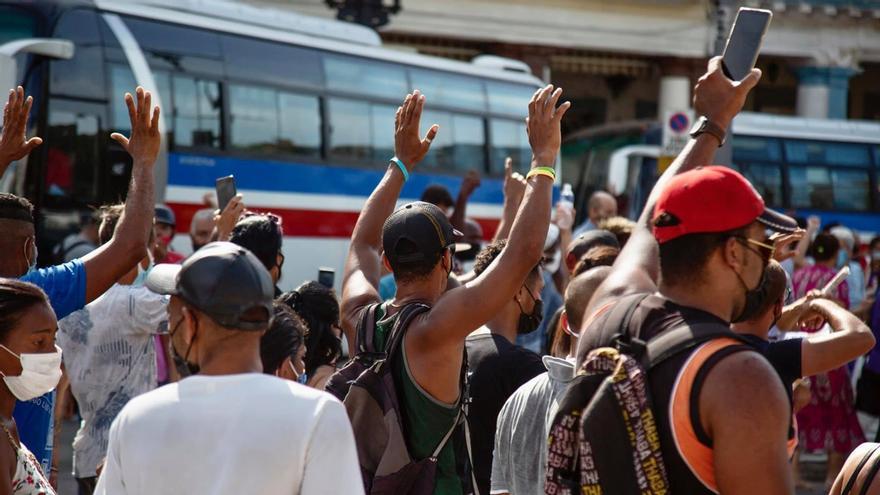
![]() 14ymedio/ EFE, Havana, August 8, 2021 – Amnesty International (AI) asked the Cuban Government this Saturday to allow it to enter the country to verify the situation of the people detained on July 11 (11J) after the protests that were generated on the island.
14ymedio/ EFE, Havana, August 8, 2021 – Amnesty International (AI) asked the Cuban Government this Saturday to allow it to enter the country to verify the situation of the people detained on July 11 (11J) after the protests that were generated on the island.
“For years, we in AI have requested entry to Cuba, without success. Today I reiterate my request to (President) Miguel Díaz-Canel to enter the country to verify the situation of people unjustly imprisoned for exercising their right to protest,” said Erika Guevara-Rosas, Amnesty International’s director for the Americas, on her official Twitter account.
She also shared a letter sent on August 5 to the Cuban authorities requesting that they provide information regarding the number of people who were detained in the protests.
In the letter, the organization asked for information on the number of people who have been released to date, “and how many remain in the custody of the State and under investigation.”
On July 11, hundreds of Cubans took to the streets to protest against the Government with cries of “down with the dictatorship,” “freedom,” “we are not afraid” and to blame the regime for the shortage of food, basic products, and medicines, the proliferation of shops with exclusive payment in foreign currency, and the chronic power outages.
Cuba is going through a serious economic crisis, with its coffers empty and unable to cope with its debts, to which has been added in recent weeks a dangerous rise in Covid-19 cases.
During and after the protests, which ranged from peaceful demonstrations to clashes with the police and looting in some towns, there was a wave of arrests of participants and alleged instigators, including anonymous citizens, artists, opposition activists, and independent journalists.
The Government has not offered data on detainees and it is unknown how many there are, although organizations have carried out their own studies that number them from more than one hundred to thousands throughout the country.
According to judicial authorities, as of August 5, 62 people have been tried for their participation in the protests, but the official number of detainees is still unknown.
In this context, AI requested in its letter that the Cuban government send information regarding the specific location of the detention centers where the people are detained, as well as the breakdown by jail or other place of detention in different parts of the country.
Finally, it requested that the authorities indicate the criminal charges made, broken down by number of people detained, and by gender or sex.
The greatest shouts of the 11J protest “were political: Freedom! and Down with the dictatorship!” insisted the Cuban Center for Human Rights (CCDH), led by the opposition activist Martha Beatriz Roque.
In its most recent report, the Havana-based organization alleged that, even if there had been little evidence of human rights violations in Cuba before, the events during the demonstrations and the days after “have made clear how the dictatorship breaks the very laws that it has passed, and how it handles those who participated in these protests, and their families ,behind the scenes. ”
In the same way that countless people tell “how they were beaten and tortured,” the regime “denies that this happened and wants to make it look like all the arrests were carried out with due process guarantees.” But, the CCDH insists, “the many videos, photos, and testimonies uploaded to the social networks support the version of the protesters.”
“The feeling of defenselessness about any type of right, which until now belonged mostly to the opposition, has spread to the social fabric, and many families have now felt at a visceral level ’not being able to do anything,’ not even knowing where their loved ones are,” decries the organization.
Along with the arrests and repression for the 11J protests, the CCDH indicated that the harassment and police siege of artists, activists, and independent journalists is continuing, as is the case with reporters Luz Escobar, from the daily 14ymedio, and Héctor Luis Valdés Cocho, of ADN Cuba, who was also arrested last month.
Translated by Tomás A.
____________
COLLABORATE WITH OUR WORK: The 14ymedio team is committed to practicing serious journalism that reflects Cuba’s reality in all its depth. Thank you for joining us on this long journey. We invite you to continue supporting us by becoming a member of 14ymedio now. Together we can continue transforming journalism in Cuba.
